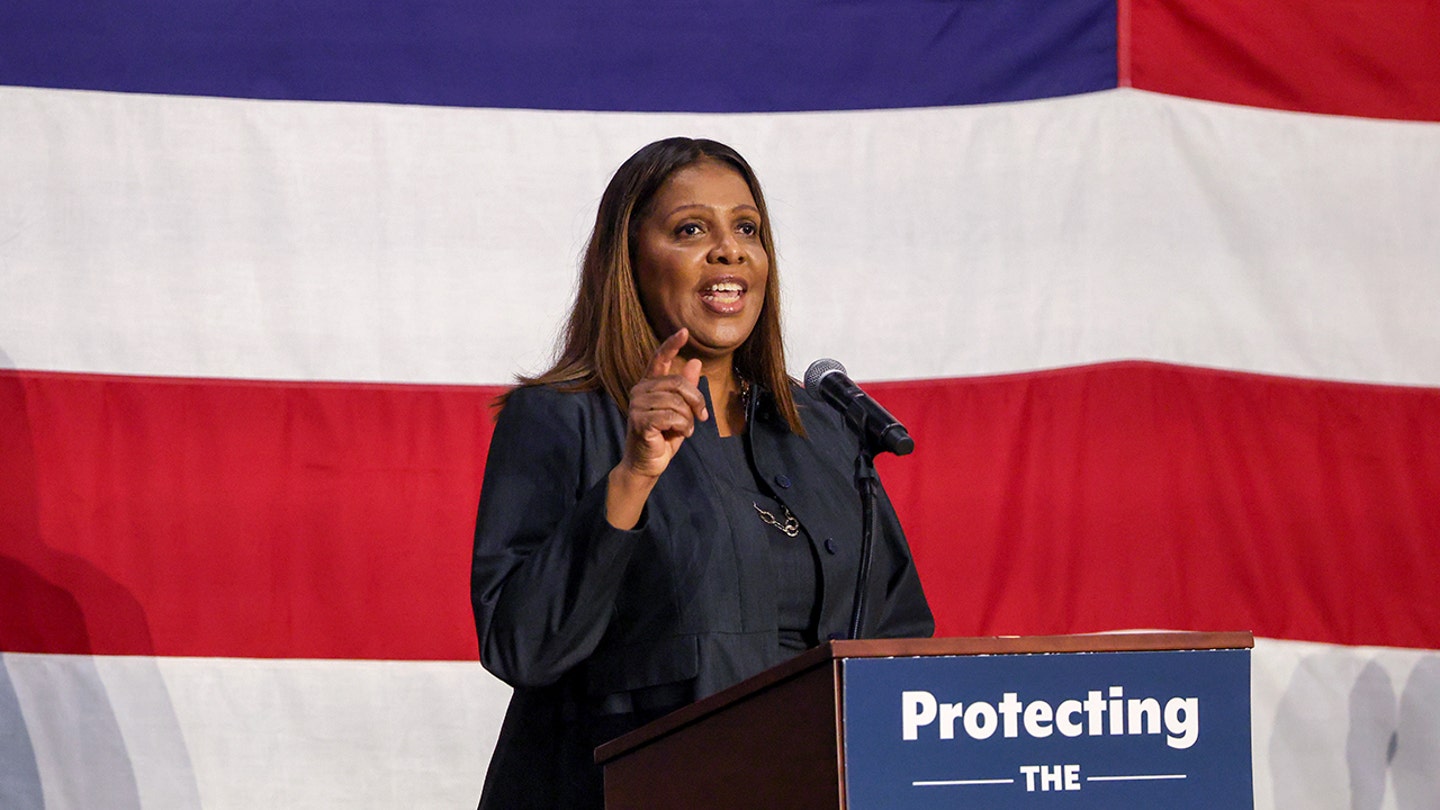Letitia James Indicted: The Shockwave That Split America in Two
It began with a whisper in Washington and ended with a political earthquake. On the morning of October 9, 2025, the nation woke to headlines that seemed almost unreal: New York Attorney General Letitia James — the woman who took on Donald Trump and won — had been indicted on federal bank fraud charges. Within hours, the country’s political map cracked down the middle. To millions, the case was justice finally coming for a powerful Democrat. To millions of others, it was proof that America’s justice system had become a weapon — one now turned against its own defenders.
The indictment came from a federal grand jury in Virginia, charging James with misrepresenting a property she owned in Norfolk as a “secondary residence” to secure a better mortgage rate. Prosecutors allege she rented the home out while benefiting from lower interest payments, saving roughly $19,000. On paper, it’s a case of financial dishonesty. But in reality, it’s far more than that — it’s a political grenade lobbed straight into the heart of an already polarized nation.

James, who built her career by vowing to “hold the powerful accountable,” found herself standing on the other side of that promise. Within minutes of the announcement, her office released a statement: “This is a politically motivated attack, orchestrated by those who fear accountability.” Her lawyers called the charge “administrative at best, malicious at worst.”
But for her critics — especially in the Republican Party — the indictment was poetic justice. “No one is above the law,” declared several conservative lawmakers, echoing the very words James had used repeatedly when investigating Donald Trump. On Fox News, the story ran on loop, with pundits describing it as “the ultimate reversal.” One anchor said, “The hunter has become the hunted.”

Letitia James is not just any attorney general. She’s the woman who turned Trump’s business empire inside out, leading a civil fraud case that resulted in a $450 million judgment against him and his companies. She became a folk hero to progressives and a sworn enemy to conservatives. Trump himself called her “a racist disaster for New York,” while Democrats hailed her as “a fearless crusader for justice.”
That’s what makes this moment so explosive. Her fall, if it comes, would not just be personal — it would shake the very foundations of the partisan battlefield she helped define.

In New York, supporters rallied outside her Manhattan office, waving signs that read “Hands Off Letitia” and “Justice for the Justice Seeker.” Online, hashtags like #StandWithTish and #WeaponizedJustice trended within hours. The outrage wasn’t just about James — it was about what her prosecution symbolized.
To many Democrats, this is a chilling message: that if you challenge power — particularly Trump’s — power will find a way to destroy you. “It’s the kind of authoritarian tactic we used to read about happening in other countries,” said one Democratic strategist. “Now it’s happening here.”
But the other side saw something very different. For conservatives, the indictment was long overdue. They pointed to years of what they called selective justice — Democrats pursuing Trump, while ignoring alleged wrongdoing within their own ranks. “This is what accountability looks like,” one GOP senator posted. “Letitia James weaponized her office to attack political opponents. Now the law is holding her to the same standard.”
The debate over what’s fair and what’s political has become the defining tension of this era. But in this case, even the process itself has raised questions. Reports indicate that the lead prosecutor in the Eastern District of Virginia, Erik Siebert, was replaced just days before the indictment was filed — a sudden move that many in the Justice Department privately called “highly irregular.” His replacement, Lindsey Halligan, has ties to several Trump-aligned legal organizations. The optics alone have fueled suspicions that this wasn’t merely about a mortgage document — it was about revenge.

From Capitol Hill to cable news, the reactions have been visceral. Senate Majority Leader Chuck Schumer accused the Justice Department of “acting like the President’s personal attack dog.” Meanwhile, Republican House leaders demanded that James step down immediately, calling her “unfit to uphold the law while under indictment.”
The White House, notably, has stayed silent. President Trump — who now occupies the Oval Office again after his narrow 2024 victory — has made no official comment. But aides confirmed he was “aware of the situation.” For those following the breadcrumbs, the silence speaks volumes.
Behind the scenes, Washington insiders are calling this the most politically charged prosecution since Watergate. Some Justice Department veterans say the case should never have gone to a grand jury — that it’s “paper-thin,” based on a technical misrepresentation that would normally be handled with a fine. Others argue that intent matters: if James knowingly lied to a bank, that’s a federal crime, no matter who she is.
The question now is whether this will be judged in court — or in the court of public opinion.
James’s defense strategy seems to hinge on the latter. Her team has already begun framing the case as part of a broader purge of Trump’s enemies. In recent months, the former FBI director James Comey and several former Justice Department officials linked to Trump-era investigations have faced similar scrutiny. Each time, Trump’s allies have celebrated; each time, Democrats have warned of creeping authoritarianism.
For James, the stakes could not be higher. If convicted, she could face up to 30 years in prison — though legal experts say that’s unlikely. More realistic would be a suspended sentence, a fine, or even a plea deal. But politically, even a whiff of guilt could end her career and damage the credibility of Democratic-led legal actions against Trump.
And that may be the real goal.
“Discredit the messenger,” one former prosecutor told The Guardian. “That’s the playbook. If you can make Letitia James look corrupt, you can undermine everything she ever did against Trump.”
Already, conservative media outlets are revisiting her past investigations — from her lawsuits against ExxonMobil and the NRA to her oversight of the Trump Foundation. Each headline feels designed to reinforce a single narrative: that Letitia James is not a symbol of justice, but of hypocrisy.
Meanwhile, liberal commentators warn that the indictment will have a chilling effect on prosecutors nationwide. “Who’s going to want to take on a powerful political figure if they know the next administration might come for them?” wrote one op-ed in The Atlantic. “This isn’t justice. It’s vengeance dressed up in legal language.”
In New York, the mood is tense. Inside the AG’s office, staff describe an atmosphere of disbelief. “We’re in shock,” said one senior aide. “People here worked their whole lives believing in the system. Now they’re wondering if the system believes in them.”
For Letitia James herself, the coming weeks will be defining. Her first court appearance in Norfolk on October 24 is expected to draw massive crowds — both supporters and protesters. Security preparations are already underway. A media frenzy is guaranteed. Every gesture, every word, will be dissected live on television.
What makes this case so combustible isn’t the alleged crime — it’s what it represents. To Trump’s base, it’s proof that the tide has finally turned, that the “deep state” is being dismantled piece by piece. To his opponents, it’s the confirmation of their worst fears — that the machinery of justice has been hijacked to settle political scores.
Somewhere in between lies a more unsettling possibility: that truth itself no longer matters.
In an America divided by perception, every fact becomes an opinion, every indictment a referendum on loyalty. The same event that one side calls “justice served” is seen by the other as “democracy dying.” And as Letitia James walks into a Virginia courtroom, she carries more than her own fate — she carries the weight of that divide.
The irony, of course, is impossible to ignore. Just months ago, James stood before cameras in Manhattan, speaking about accountability and the rule of law. “No one is above the law,” she said then, her voice firm. Now, those same words echo back at her — weaponized, distorted, and thrown like stones.
It’s easy to forget that beneath the headlines, there’s a human being — a woman who rose from Brooklyn’s working-class neighborhoods to become one of the most powerful legal figures in the nation. She built her career on fighting bullies, corporate greed, and political corruption. To her supporters, that’s what makes this prosecution not just suspicious, but cruelly ironic.
Still, politics is rarely about fairness. It’s about power. And right now, Letitia James is caught in the middle of a power struggle that’s far bigger than her mortgage paperwork. Her indictment may be written in legal language, but its implications are pure politics — a message to anyone who dares to challenge the throne.
The coming trial promises to be explosive. It will test not just James’s defense, but America’s faith in its own institutions. It will force the country to ask whether justice can survive politics — or whether politics has finally consumed it.
In the end, no matter the verdict, something fundamental has already changed. The line between justice and vengeance — between accountability and persecution — has blurred beyond recognition.
If even the Attorney General of New York can be taken down like this, who’s really safe from the storm that’s coming next?

